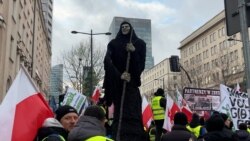Polish farmers marched in central Warsaw on January 3 to voice their opposition to European Union policies toward imports from Ukraine ahead of a gala to mark Poland taking the rotating EU presidency for the next six months.
Farmers carrying Polish flags and blowing horns took part in the demonstration to protest the import of Ukrainian agricultural products, which they say has driven down prices for their goods.
"We protested last year and we will continue to protest because nothing has been fixed," said one of the farmers in an address to the protesters.
Imports of Ukrainian grain to the European Union touched off anger last year as farmers blocked border crossings demanding the re-imposition of customs duties on agricultural imports from Ukraine, which were waived following Russian’s full-scale invasion in 2022.
The farmers say imports from Ukraine are flooding Europe with cheap grains, making it impossible for them to compete.
A participant in the Warsaw march on January 3 told RFE/RL that Poland's independence is more important than its membership in the European Union.
"The EU is welcome here, but it is a union of countries, not one country," the protester said.
The march coincided with a gala to mark Poland taking the rotating EU presidency, which featured its own controversy.
The the entire diplomatic corps was invited to attend the gala, held at the National Theater in Warsaw, but the Hungarian ambassador was barred because of Budapest’s decision to grant political asylum to a former Polish deputy minister accused of corruption.
Polish Foreign Minister Radoslaw Sikorski sent a note to Ambassador Istvan Ijgyarto that he was “not welcome” at the event, said Magdalena Sobkowiak-Czarnecka, Poland's deputy minister for European Affairs.
Sobkowiak-Czarnecka told public broadcaster TVP Info that Hungarian Prime Minister Viktor Orban was also not invited to the evening event.
Sobkowiak-Czarnecka said this was a consequence of Hungary granting political asylum to Marcin Romanowski, a former deputy justice minister in the former government led by the Law and Justice party.
Hungarian Foreign Minister Peter Szijjarto told the Hungarian news outlet HVG that the decision was a "pathetic and childish."
Poland last month summoned Hungary's ambassador over Budapest's decision, calling the move a "hostile act" that runs counter to the principle of loyal cooperation among members of the European Union.
Polish prosecutors have charged Romanowski with 11 offenses, including participation in an organized crime group and attempted embezzlement of funds totaling almost 40 million euros ($41 million) from a fund for crime victims that he supervised.
Romanowski denies the charges and had has argued that he is the victim of political retribution by Tusk's government.
When the Hungarian prime minister's office announced that it had granted asylum to Romanowski, it accused the Polish government of persecuting its political opponents.
The gala featured speeches by Tusk and new European Council President Antonio Costa.
Tusk stressed the importance of “security, competitiveness, innovation, imagination, courage [and] good leadership" as “sources of strength."
"If Europe is weak, it will not survive," Tusk warned.
Costa said the European Union must continue to support Ukraine in its fight against Russia’s full-scale invasion.
"We must continue to stand with Ukraine as much as necessary for as long as it takes to win a comprehensive, just, and lasting peace," he said.
Costa praised Poland for being "at the forefront of Europe's defense capabilities that we need to develop to protect our countries, our societies, our values."












